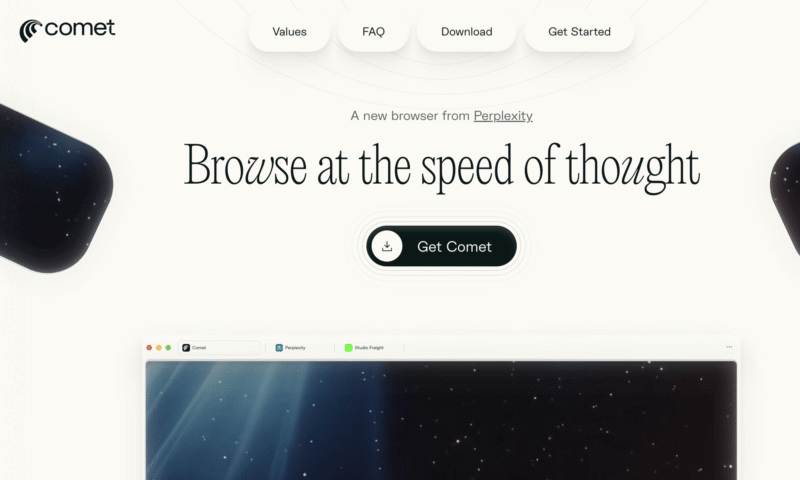The Race for Agentic AI Browsing: Perplexity Launches Comet AI Browser; OpenAI Browser Coming Soon
Following Google AI search and Dia, now Perplexity is launching its Comet AI browser. Meanwhile, OpenAI reportedly plans to launch its own AI browser in the coming weeks. These AI tools can do tasks for you, but they also collect your data to “personalize” your browsing.

AI continues to shake up the browser status quo. In May, Google integrated AI overviews into Search, starting in the U.S. and expanding to over 200 countries and territories.
In June, The Browser Company launched the Dia Browser for Arc members; non-members can join the waitlist.
Now in July, Perplexity Max users can access the Comet Browser; non-members can join the waitlist.
In the next few weeks — likely in August — OpenAI reportedly plans to launch its own AI browser, according to Reuters.
Additionally, in August, Microsoft is ending Bing Search APIs; instead, users can choose between “Grounding with Bing Search,” which uses Azure AI agents, or choose an alternative, like the Brave API.
A major theme of many of these AI browsers is not only the ability to search, reply to questions and reason the answers, but also the ability to complete tasks for you like an assistant or agent — offering “agentic” functionality.
For example, in a demo of Perplexity’s Comet browser, a user could ask it to search for one-way, direct flight from Newark to Orlando the following day for $400; the browser would open multiple searches across different websites — displaying a small thumbnail window to show its actions on the sites in real time — and then offer the best option.
It’s important to note that, because many of these new AI browsers are intended to be personalized to each user and access is through established accounts, search history and preferences will be linked to your account and anonymous browsing won’t be possible.
“Comet learns how you think, collaborates in your research, and helps keep your digital life organized–so you’re never lost in tabs or forget what inspired you.”
Learning how a user thinks sounds both helpful… and very creepy. And AI search tools are able to do this through data collection and analyzing that data.
Perplexity collects data to “improve and personalize your experience,” and “to ensure the core functionality and security of Perplexity’s services;” it saves account details for account creation and management; it saves “information about device and site interactions (such as search queries or usage data)…to enhance how the product works, troubleshoot issues, and develop new features.”
It also says that “some data may be used to train AI models and improve the quality of search results” — though you can opt out in account settings. It also says that Perplexity does not sell data or share it with third parties “except for trusted service providers (such as payment processors or customer support) or if required by law.”
Before you sign up for any technology, it’s important to read the terms and conditions to understand what data you’re allowing the tool to collect on you — and for you to decide if using the tool is worth your privacy. Using a VPN with an account-based AI browser won’t anonymize any of your online activity; it will just change your IP address.
If you want to have more privacy and anonymity in your online searching, read our anonymous browsing guide. We will continue to report on this topic as it develops.

